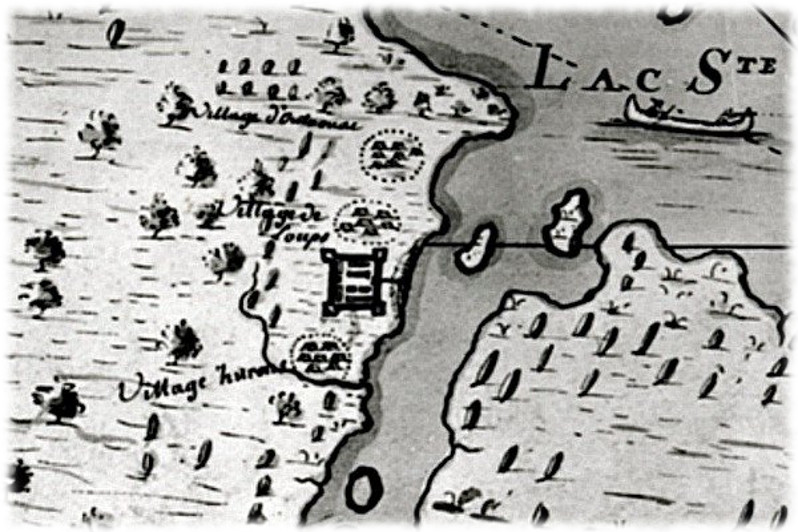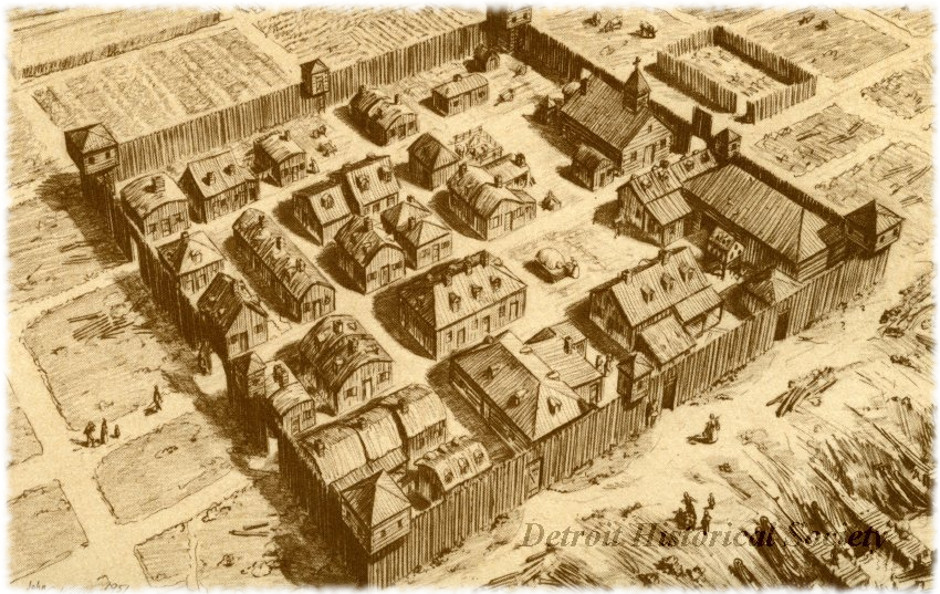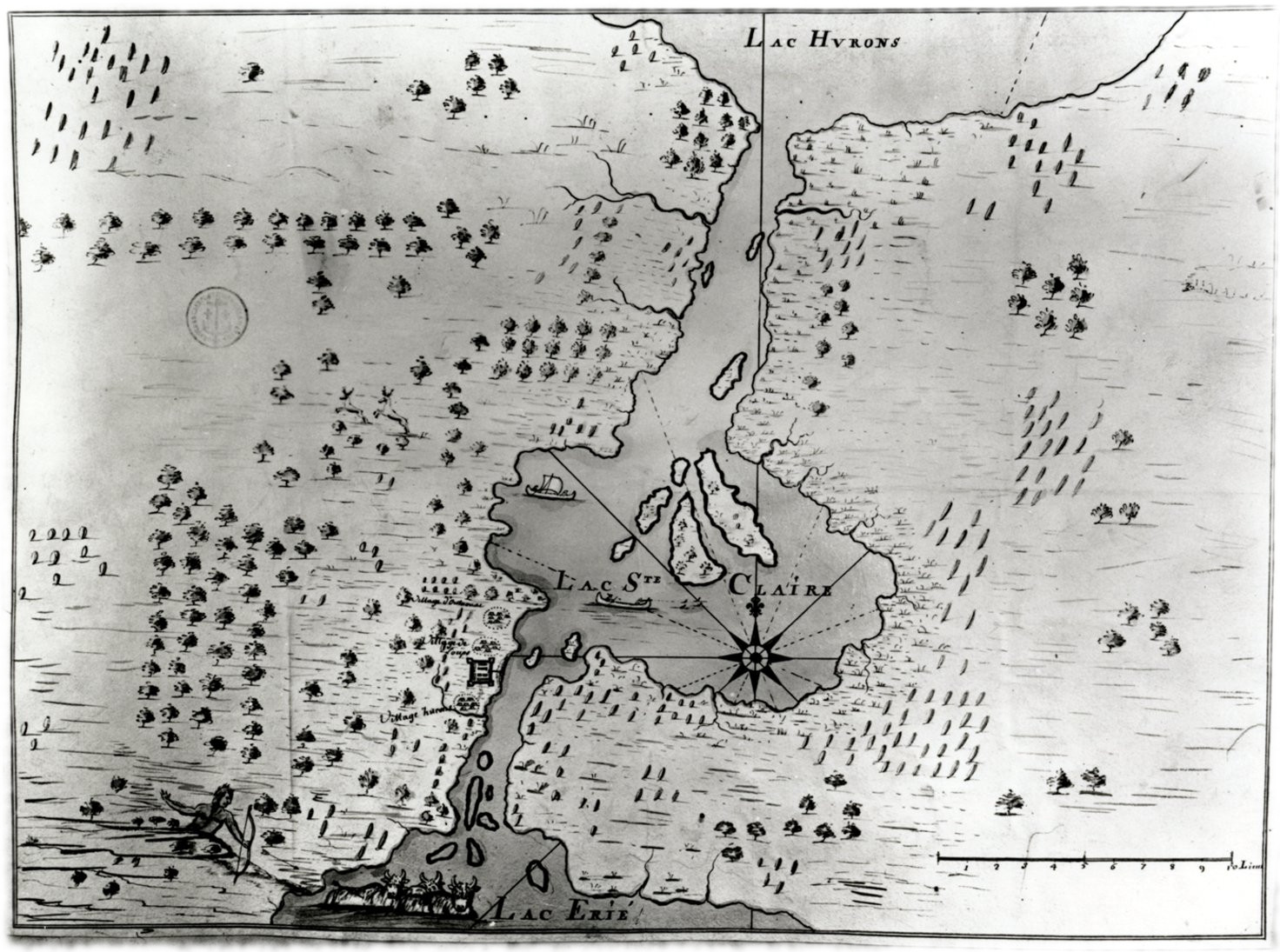Fort Pontchartrain du Détroit: Difference between revisions
No edit summary |
|||
| (6 intermediate revisions by the same user not shown) | |||
| Line 1: | Line 1: | ||
;[[Monde des ténèbres -- XVIII]] -=XVIII=- [[Detroit]] | ;[[Monde des ténèbres -- XVIII]] -=XVIII=- [[Detroit]] | ||
[[File: | [[File:Cadillac map 1701.jpg]] | ||
<br> | <br> | ||
<br> | <br> | ||
=== Beginnings === | === Beginnings === | ||
The first recorded mention of the site was in 1670, when French missionaries found a stone idol venerated by the Indians there and destroyed it with an axe. Early settlers planted twelve missionary pear trees "named for the twelve Apostles" on the grounds of what is now Waterworks Park. | The first recorded mention of the site was in 1670, when French missionaries found a stone idol venerated by the Indians there and destroyed it with an axe. Early settlers planted twelve missionary pear trees "named for the twelve Apostles" on the grounds of what is now Waterworks Park. | ||
<br> | |||
<br> | |||
[[File:Detroit Cadillac detail map.jpg]] | |||
<br> | |||
<br> | |||
<br> | |||
The city name comes from the Detroit River (French: le détroit du Lac Érie), meaning the strait of Lake Erie, linking Lake Huron and Lake Erie; in the historical context, the strait included Lake St. Clair and the St. Clair River. The sieur de Cadillac in 1698 proposed to his government in Paris that Detroit be established as a shelter for displaced Indian allies. Paris approved and in 1701 Cadillac led a party of 100 Frenchmen to establish a post called Fort Pontchartrain du Détroit, naming it after his sponsor the comte de Pontchartrain, Minister of Marine under Louis XIV. In 1704 he was given ownership over the strenuous opposition of officials in New France. An investigation by de Pontchartrain showed Cadillac was a tyrannical profiteer whose mischief hurt the French cause, so Cadillac was removed and sent to faraway New Orleans as governor of Louisiana. | The city name comes from the Detroit River (French: le détroit du Lac Érie), meaning the strait of Lake Erie, linking Lake Huron and Lake Erie; in the historical context, the strait included Lake St. Clair and the St. Clair River. The sieur de Cadillac in 1698 proposed to his government in Paris that Detroit be established as a shelter for displaced Indian allies. Paris approved and in 1701 Cadillac led a party of 100 Frenchmen to establish a post called Fort Pontchartrain du Détroit, naming it after his sponsor the comte de Pontchartrain, Minister of Marine under Louis XIV. In 1704 he was given ownership over the strenuous opposition of officials in New France. An investigation by de Pontchartrain showed Cadillac was a tyrannical profiteer whose mischief hurt the French cause, so Cadillac was removed and sent to faraway New Orleans as governor of Louisiana. | ||
| Line 15: | Line 20: | ||
:<span style="color:maroon;"> ''"Sylvestre commanded that a storehouse and stockade be built for his protection, that project was handed over to Lamothe Bardigues, for the Toreador elder did not entirely trust the capabilities of the Gascon Laumet. Despite, Lamothe's best efforts, the first building completed was Ste. Anne's Church and so Sylvestre d'Esparbes took refuge from the day in a pit beneath the church where the corpses of the settlement's first casualties were laid to rest. Perhaps not as timely as his master might have wished, Lamothe did complete the stockade next, constructing it of logs with defensive bastions or towers in each corner. After the fort was established, some Ottawa and Huron moved into the area for the convenience of trading with the French. Although Sylvestre fed upon members of these tribes, the number of casualties remained low, due in part or in full to the efforts of Lamothe Bardigues to restrain his master and the artful way in which he explained away untimely deaths."'' | :<span style="color:maroon;"> ''"Sylvestre commanded that a storehouse and stockade be built for his protection, that project was handed over to Lamothe Bardigues, for the Toreador elder did not entirely trust the capabilities of the Gascon Laumet. Despite, Lamothe's best efforts, the first building completed was Ste. Anne's Church and so Sylvestre d'Esparbes took refuge from the day in a pit beneath the church where the corpses of the settlement's first casualties were laid to rest. Perhaps not as timely as his master might have wished, Lamothe did complete the stockade next, constructing it of logs with defensive bastions or towers in each corner. After the fort was established, some Ottawa and Huron moved into the area for the convenience of trading with the French. Although Sylvestre fed upon members of these tribes, the number of casualties remained low, due in part or in full to the efforts of Lamothe Bardigues to restrain his master and the artful way in which he explained away untimely deaths."'' | ||
<br> | |||
<br> | |||
[[File:Detroit arial map 1702.jpg]] | |||
<br> | |||
<br> | |||
<br> | |||
Once Fort Pontchartrain was completed, small groups of settlers made their way from Montreal to join those who had already established themselves thirty years before. The settlement surrounding the fort, came to be know informally as Detroit and over the next five years it not only grew larger, but more profitable as well. | Once Fort Pontchartrain was completed, small groups of settlers made their way from Montreal to join those who had already established themselves thirty years before. The settlement surrounding the fort, came to be know informally as Detroit and over the next five years it not only grew larger, but more profitable as well. | ||
Latest revision as of 22:33, 25 July 2020
- Monde des ténèbres -- XVIII -=XVIII=- Detroit
Beginnings
The first recorded mention of the site was in 1670, when French missionaries found a stone idol venerated by the Indians there and destroyed it with an axe. Early settlers planted twelve missionary pear trees "named for the twelve Apostles" on the grounds of what is now Waterworks Park.

The city name comes from the Detroit River (French: le détroit du Lac Érie), meaning the strait of Lake Erie, linking Lake Huron and Lake Erie; in the historical context, the strait included Lake St. Clair and the St. Clair River. The sieur de Cadillac in 1698 proposed to his government in Paris that Detroit be established as a shelter for displaced Indian allies. Paris approved and in 1701 Cadillac led a party of 100 Frenchmen to establish a post called Fort Pontchartrain du Détroit, naming it after his sponsor the comte de Pontchartrain, Minister of Marine under Louis XIV. In 1704 he was given ownership over the strenuous opposition of officials in New France. An investigation by de Pontchartrain showed Cadillac was a tyrannical profiteer whose mischief hurt the French cause, so Cadillac was removed and sent to faraway New Orleans as governor of Louisiana.
- "When the Gascon adventurer Antoine Laumet, sieur de Cadillac, arrived at the strait between Lake Huron and Lake Erie on July 23, 1701, he and his one hundred men were not alone. Unknown to most, Antoine Laumet was the ghoul of Sylvestre d'Esparbes, a Toreador elder of great age who had formerly resided in the South of France. Ostensibly, the French party had come to the strait to establish a new fort on the orders of the French monarch Louis XIV, in the hopes of preventing British encroachment into the west and maintaining the French monopoly in the North American fur trade. In reality, Anoine Laumet and a mortal descendant of Sylvestre, born of noble blood called Lamothe Bardigues were to act as the elder Toreador's agents in French affairs and his daytime guardians."
- "Upon arrival, Antoine Laumet held a celebration to formally take control of the region, in honor of the Comte de Pontchartrain, his mortal patron and he named the new settlement as Fort Pontchartrain du Detroit. While the mortal soldiers were celebrating with wine and brandy, Sylvestre d'Esparbes drained a small native American tribe residing in the area, and in the process the Toreador elder revealed himself the other nocturnal hunters of the strait. Despite this event and following depredations by Sylvestre, the settlement experienced few if any difficulties."
Ste. Anne de Détroit, founded 1701, is the second oldest continuously operating Catholic parish in the United States; it was the first building erected in Detroit.
- "Sylvestre commanded that a storehouse and stockade be built for his protection, that project was handed over to Lamothe Bardigues, for the Toreador elder did not entirely trust the capabilities of the Gascon Laumet. Despite, Lamothe's best efforts, the first building completed was Ste. Anne's Church and so Sylvestre d'Esparbes took refuge from the day in a pit beneath the church where the corpses of the settlement's first casualties were laid to rest. Perhaps not as timely as his master might have wished, Lamothe did complete the stockade next, constructing it of logs with defensive bastions or towers in each corner. After the fort was established, some Ottawa and Huron moved into the area for the convenience of trading with the French. Although Sylvestre fed upon members of these tribes, the number of casualties remained low, due in part or in full to the efforts of Lamothe Bardigues to restrain his master and the artful way in which he explained away untimely deaths."

Once Fort Pontchartrain was completed, small groups of settlers made their way from Montreal to join those who had already established themselves thirty years before. The settlement surrounding the fort, came to be know informally as Detroit and over the next five years it not only grew larger, but more profitable as well.
Personalities
Mortals
- Antoine Laumet -- Sieur de Cadillac -- A Gascon adventurer meant for better things.
- Lamothe Bardigues -- The Loyal Servant
- Jean-Michel Dubois -- Priest of St. Anne's Church {Entranced by Tremen}
- Jean Bouchard -- Fur traderfrom Avignon {Entranced and bound to Tremen}
- Rene Deniau -- Soldiers of the Fench Army {Blood bound to Tremen}
- Lucas Family -- Emile (patriarch)
- Alain Jacques --
- Bertrand Droit
- Jacinthe Comtois
- Lise Fay
- Irene Sauvageot
- Blanche Fontaine
- Aurel Jundt -- Austro-Hungarian Jew in the service of Louis XIV of France
Supernaturals
- Sylvestre d'Esparbes -- Master of Detroit
- Edmond Tremblay -- The Second Vampire
- Kaniehtiio -- Iroquois {Mohawk} - Ghost Woman
- Tremen Hall -- Naga Raja Traveler
